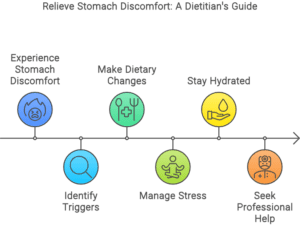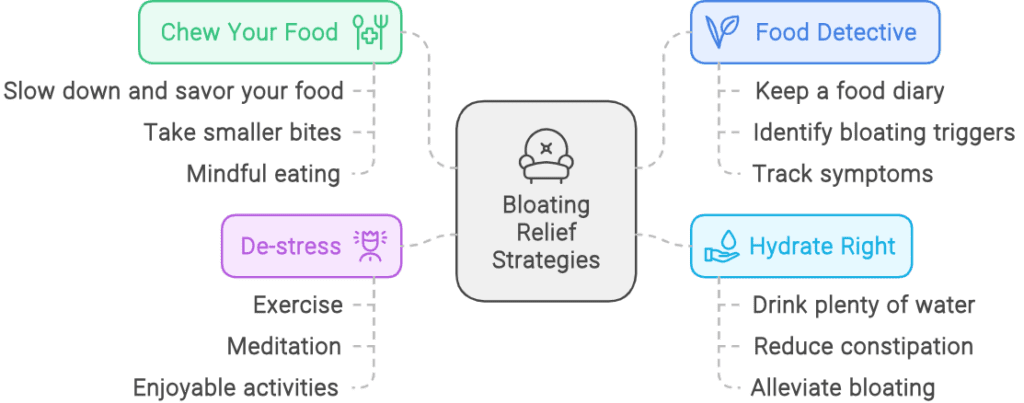
Bloating After Eating and What You Can Do About It.
Do you ever feel like your stomach has suddenly doubled is size? And everything in your gut has an uncomfortable tightness? So many of us have been there – with at least 50% of Australian adults experiencing unpleasant gut symptoms such as bloating, gas and constipation(1). With 1 in 7 experiencing symptoms they describe as distressing (1). As a dietitian, I see people every week with stomach discomfort. Common symptoms range from minor discomfort, to tighness, pain, and sometimes more serious issues such as constipation and diarrhea. I’ve also experienced stomach bloating myself after a meal many times. Dealing with the discomfort, tightness, urgency in bowel movements, and on occasion, pain through my stoamch. Thankfully, I have been able to reduce how often, and how bad the symptoms are for myself and my patients using a number of strategies outlined below.

What Is Causing My Bloating Stomach?
Several factors can contribute to a bloating stomach. Often, it’s caused by a build-up of gas in your digestive system. The reason for the gas build up can be caused by a few different things:
- Swallowing air: This can happen when you eat or drink too quickly, chew gum, or suck on hard candy.
- Certain foods: Cruciferous vegetables like broccoli and cauliflower, beans, lentils, and dairy products can trigger gas production in some people, leading to bloating after eating. Bloating caused by foods we eat may be worse in some people due to a condition called Irritable Bowel Syndrome (IBS), which often casues bloating symptoms, see below;
- Irritable Bowel Syndrome (IBS): As mentioned above, IBS may be the reason for your bloating, but the underlying cause of IBS is still unclear. IBS often begins after a bout of gastroenteritis, food poisoning, illness, infection, or chronic stress. If you suffer from IBS you may be more likely to have bloating, gas, and that uncomfortable feeling in your stomach. If you suspect you have IBS, you should consult your doctor or a dietitian to help you identify the causes of your bloating.
- Food intolerances: If you have lactose intolerance, for example, your body struggles to digest lactose (the sugar found in milk). Because the sugar is not digested, the bacteria in our gut use it to make gas, leading to bloating, gas, and other digestive issues. Other common food intolerences are fructose (found in fruits and sugary drinks), sorbitol (common in some fruits, and used as a sweetener in suagr-free gum and mints). Some natural food additives and colours may also be poorly absorbed (2,3). Some common additives include benzoates (juices, soft drink, cordials, medications)(3), sulphites (dried fruits, sausages), and nitrates/ nitrites (processed meats and ham) (2).
- Constipation: When stool builds up in your intestines, it can cause bloating and discomfort.

How to Get Relief
The good news? You can get relief! I have helped many clients improve thier bloating and discomfort, but each person had a very different treatment plan. So, depending on the casue of your stomach bloating, the treatment plan for you will be different:
Chew Your Food: Slow down and savor your food. Take smaller bites. Try to be mindfull when eating, enjoy the flavours and enjoy your meal. Proper chewing helps digestion and reduces air intake.
Food Detective: Keep a food diary to identify bloating triggers. Include symptoms you experience after the meal, even if symptoms occur a few hours after eating. Do this for around a week to help you identify common foods or meals that are triggers for you. You can find a food and symptom tracker here.
Hydrate Right: Drinking plenty of water keeps things moving smoothly and reduces the chances of constipation. Drinking more may help reduce bloating and other related symptoms.
De-stress: A lot esier said than done, but stress can worsen digestion, so finding healthy ways to reduce stress (think exercise, meditation, doing things you enjoy) can help.

Your Dietitian Can Help
Sometimes, figuring out the exact cause of bloating can be tricky. That’s where a Accredited Practicing Dietitian comes in! We’re bloating experts, armed with knowledge and personalized strategies to help you identify triggers, manage food sensitivities and intolerences, and create a gut-friendly diet.
Let us guide you through proven strategies to reduce your bloating and get your gut feeling great!

